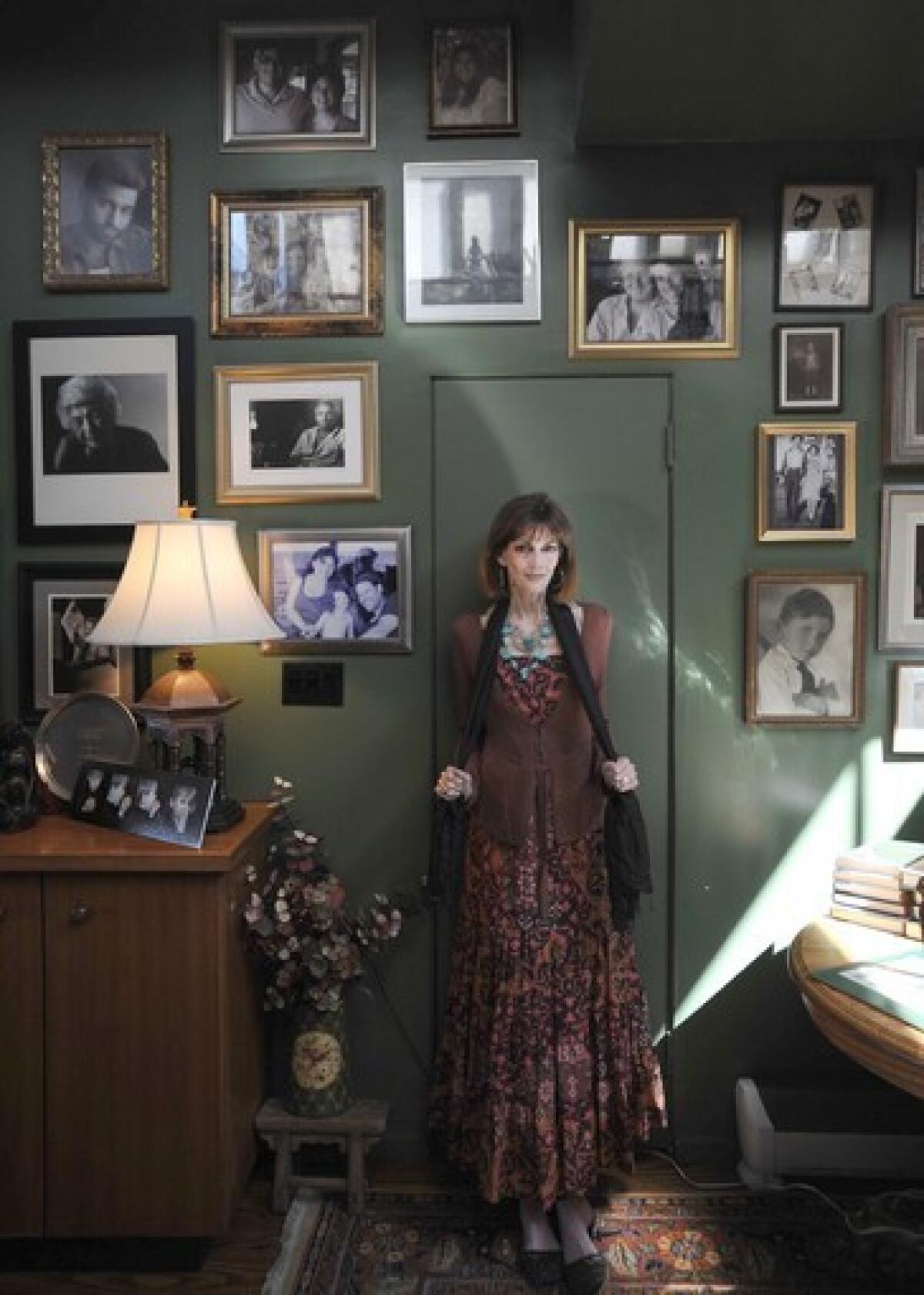Life with Norman Mailer -- and without him

- Share via
The voice explains a lot. You think, how could any woman live with the famously moody writer Norman Mailer for 33 years, and then you hear Norris Church Mailer’s soft, authoritative, Marilyn Monroe-ish voice, with its 61-year-old Arkansas twang still intact, and you have a revelation about men and women.
It is important to remember that “A Ticket to the Circus” (Random House: 432 pp., $26) is Norris’ own memoir, not Norman’s -- not even Mrs. Mailer’s. It is the story of a girl, born in Arkansas in 1949, who came of age in the 1960s and struggled to find her way of contributing to the world, which was still a man’s world. She was very tall and, by all accounts, beautiful -- that made life both harder and easier (probably in equal measure).
Norris dated a few men and, at age 20, married a man who went off to Vietnam and came back distant and detached. They divorced, and she dated a few more men, including Bill Clinton. She started teaching high school and loved it. Then, she met Norman Mailer at a party in April 1975. (She had not read any of his books, but she knew, like everyone else who followed the news, that he had stabbed his first wife in the stomach.)
Norris became his sixth wife, and when they met she was one of three women firmly fixed in his life. She had to wait for him to sculpt it to one.
Norris and Mailer were together until his death in 2007. She has two sons, two stepsons, five stepdaughters, two grandchildren and, she says, “either 10 or 11” step-grandchildren. “A Ticket to the Circus” is her third book -- the first two, “Windchill Summer” (2000) and “Cheap Diamonds” (2007), feature a young female character coming of age in Arkansas during the 1960s.
Reviews of the first two books tell you a lot about Norris’ life. Both are mostly about her marriage to Mailer, again a thing that must have had its pros and cons for a budding writer (and this was probably not in equal measure). In a 2005 interview with me, Mailer was furious at the suggested possibility that his wife might become a more successful novelist.
“Impossible!” he had said. “If she were a new shoemaker, could she be a better shoemaker than someone who had been doing it for 50 years?”
“Norman was competitive with everyone,” Norris now says. “He had to be the best writer in the world. I didn’t see it as a contest.”
She has been a mother, a grandmother, a painter, a model, an actress and a writer . . . and today she firmly considers herself a writer. When her husband died, she was determined not to write about him. After a year, she softened a little.
“I decided to do a fun little book, a sort of ‘Cheaper by the Dozen’ -- funny stories about us and our children, maybe a few recipes. It didn’t take me long to realize that we weren’t that kind of family.”
“Ticket” is quite an honest memoir, primarily in the way that it lets the reader know how Norris held her own ground all those years. Shortly after meeting Mailer, Norris moved to New York, leaving her 4-year-old son with her parents in Arkansas while she established herself in her own place and looked for work (she sent for him several months later).
In 1977, she became pregnant. Mailer divorced his fifth wife and married Norris. Fourteen years later, 14 years in which Norris believed her husband had been faithful to her, she found in a drawer in their Brooklyn Heights home evidence that he had cheated on her not once but many, many times. Somehow, they got through it.
Where did she get the courage to leap into that new life, when she was 26 and Mailer was 52? And how did she find the strength to stay in it? Norris writes that Mailer liked that her grandfather was a mule skinner. Could her backbone have come from her pioneer DNA? “I don’t know . . . I was stupid, naive or brave,” she says. “I just knew that New York was where I wanted to be. I thought, ‘If this doesn’t work out, I’m a strong, smart girl. I’ll figure something else out.’ In your 20s everything seems possible. Something was calling me here, to New York.
“Norman was always supportive of me,” she says. For his part, writing required several degrees of separation. “Just pretend I’m in South America,” he’d tell her. “Writing is a solitary profession,” she says, explaining why she didn’t get to it until after the children had grown. “There were too many other interesting things going on for me.” When she first started writing, Norris showed her husband a hundred pages. “I didn’t put it away after he said it wasn’t good,” she says. “I just kept at it. I wasn’t a slave to his opinion.”
On the other hand, Mailer always wanted his wife’s comments. He’d get “angry,” she says, “and start yelling at me. ‘This is my person you are yelling at,’ ” she’d say to him. “I guess I was just the handiest target,” she says.
Norris’ main role, she describes, was “keeping him on track. He’d be in the middle of one book and get interested in some new subject -- he’d be writing about Hitler and become fascinated with Rasputin.” Norris’ favorite book by her husband is “Ancient Evenings,” which was not a critical favorite. “I’ve read it seven or eight times,” she says. “I liked the books that allow you to put yourself in a fantasy world.”
One of Mailer’s most infamous comments is that “women should be put in cages.” The problem with reading this in the paper, Norris says, is that “you couldn’t see the twinkle in his eye.”
“I was a feminist,” she says. “I wanted to take care of myself. It was infuriating to have to get my father to cosign a bank loan. Norman was not against equal rights. He just liked to be funny and ironic.”
Early in “A Ticket to the Circus,” after her divorce, Norris describes a memory of being raped by a friend’s brother.
She doesn’t name him, and she never saw him after that night -- but she hopes that someday he will read this book and recognize himself. Her advice for young women is “to listen to your gut. If you have to ask yourself, ‘Should I leave?,’ it’s time to leave.”
Though she has clearly had a life of loving men, and one in particular, Norris says that, at 61, she can “kind of do without them.” It is the first time in her life that she has lived alone, and she’s enjoying it.
“I’ve had a wonderful life, but it was Norman’s life,” she says. “You don’t realize how much of yourself you have sublimated until you are alone. Now I don’t have to fight for the TV clicker.”
Salter Reynolds is a writing in Los Angeles.
More to Read
The biggest entertainment stories
Get our big stories about Hollywood, film, television, music, arts, culture and more right in your inbox as soon as they publish.
You may occasionally receive promotional content from the Los Angeles Times.










